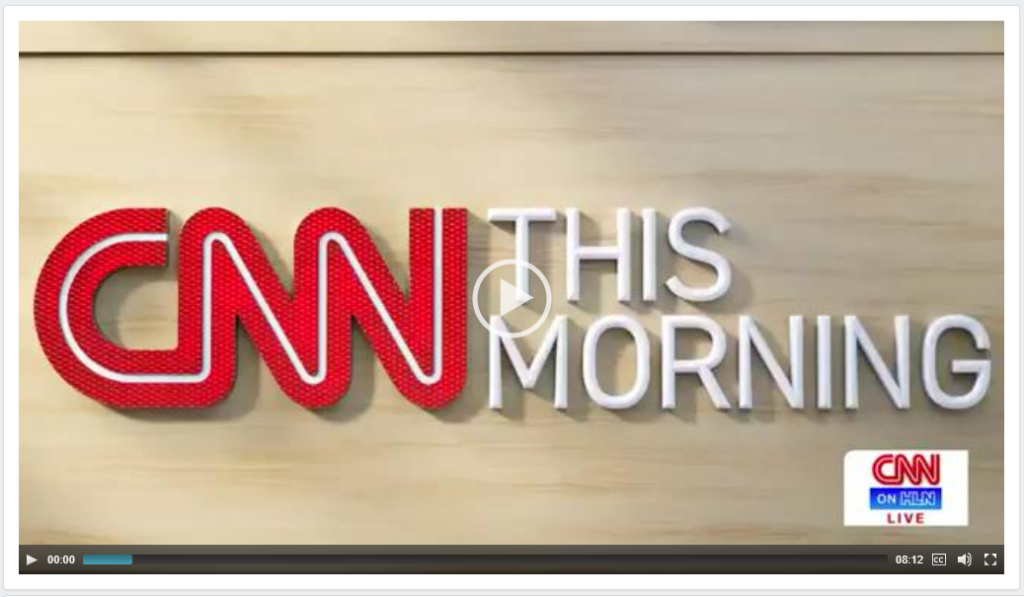Transcript of CNN This Morning Segment with Marc J. Bern
To watch the video click the above image.
>> Welcome back. A wave of new legal action against social media companies in the midst of what the us surgeon general has called a youth mental health crisis in this country.
>> Too often, kids on social media are exposed to extreme, inappropriate and harmful content. Indeed, nearly half of adolescents are saying that social media now makes them feel worse about their bodies.
>> Surgeon general report warns teenagers are spending an average of 3.5 hours on social media every day, every day. And he says it’s resulting in depression, anxiety, poor sleep , eating disorders and cyberbullying.
>> Last week, the American federation of teachers, the nation’s second largest teachers union, issued a report calling on social media organizations to rein it in, citing the dramatic disruption in the teaching and learning ecosystems of our nation’s schools. Well, now, hundreds of school districts across the country are actually suing the parent companies of Instagram, Facebook, tiktok and
00:01:00
Snapchat. Why joining us now is attorney mark J. Byrne who is representing 40 school districts, including the aspen school district and their lawsuit against big tech companies. Also, CNN senior media analyst Sarah fisher with us as well. So, mark, when it comes to where we begin here regarding social media use among kids, you’ve said that, quote, there is no we have an epidemic that is no different than opioids. Can you explain to us what you mean by that?
>> Absolutely.
>> The major social media companies have written their algorithms is to intentionally addict children, school aged children, to their algorithms.
>> This is no different than drug companies that sold opioids and claimed that they were not addictive. Certainly the social media companies are doing the exact same thing. It’s a really interesting argument.
00:02:01
>> I think one of the differences, Sara, is the lawsuits against the opioid companies, Purdue pharma and others they could point to they could point to deaths here or you’re not pointing largely to deaths. And I wonder what you think, given all of the litigation so far against these big social media companies, even up to the supreme court on separate section 230 matters just hasn’t really proved successful?
>> Yeah, that’s in part because to your point, poppy, section 230 is a law that shields these big tech platforms from being sued or held accountable for some of the third party content on their sites.
>> However, it doesn’t mean that these platforms shouldn’t be held accountable for using their resources more responsibly. And I think that points to what we’re seeing with this lawsuit. You know, Instagram has rolled out a bunch of tools to combat bullying. Snapchat has taken the fentanyl crisis really seriously and rolled out tools to prevent some of the messaging that causes that. YouTube is trying to change its content. Moderation algorithms to stop radicalization. But all in all,
00:03:03
I think what mental health experts are warning, including all the way up to the surgeon general, is that this is just not working, that teens are not experiencing the same level of joy and optimism that social platforms thought could bring them when they first rolled out.
>> I do want to read what meta, which is the parent company of Facebook and Instagram and now threads says reports from the CDC and others point to growing academic pressure concerns of safety in schools, lingering impact of the pandemic, and limited access to mental health care as key factors. We want to work with the schools and academic experts to better understand these issues and how social media companies can provide teens with support they need. Mark, what do you say to that? I mean, you’re suing them .
>> Well, I clearly see they have a desire to do defend their actions. And that is not going to work with respect to what they have said. This is this is an epidemic with respect to our
00:04:04
school age. Children, children, as we heard a few moments ago, are spending over three hours a day on social media to you have various platforms such as as social Snapchat, where children can find out exactly what their peers are doing. Virtually at any moment and if they’re left out. So we see this cyberbullying, the children becoming very adept at watching other kids, but it’s affecting them on a moment to moment basis . This and it is something that the large social media platforms , firms can certainly control goal to at least a degree see when the internet first came out . Ten years ago or so or a little more, there were about 300,000 odd users. Today there
00:05:05
are 4 billion users in the internet. And this is something that must be controlled or are school age children are going to continue to suffer and suffer dramatically.
>> So, mark, really quickly, before I let you go, one thing that stood out to me is that you’re doing this on behalf of these school districts, right? Who are saying we are having to deal with this. Why do you believe that this is going to be a more effective lawsuit going against these companies, coming at it from that angle as opposed to from a parent agent who says, I can’t control this with my kid, I don’t know how to break through this algorithm or from a child who says the same thing. Why is it the school district there?
>> There are certainly there are lawsuits. It’s involving parent and children. But we believe that the school districts whose budgets are continually being stressed and now have to put out much, much, much more money just to combat the social the mental
00:06:09
illness caused by social, by the social media companies. And we believe that the school districts are entitled to get that money back. And so just as in opioids, it’s an abating cause of action where we’re trying to get the additional money back for them in a small district like aspen, they have had to put on three new full time health care professionals, which is going to further stress the budget. All the schools in this country need more, more money and they do not need more money. They do not need to be spending more money every day on these types of problems. But they certainly are. Sarah the insurance companies were successful in taking on big tobacco in the 90s because they said you marketed to kids and you knew it and those that went after the opioid creators and
00:07:10
distributors were successful because they said doctors you knew it was addictive and companies you knew it was addictive and you did it anyway.
>> Could that same logic work if this has taken all the way up to the higher courts against social media companies? You knew about? Addictiveness. We know it’s harmful because of X and therefore you’re liable.
>> It could if there’s proof that they knew about it and they didn’t do anything to stop it. The challenge, poppy, and this is where I think some of these lawsuits are going to run into a little bit of a road bump. Is that these tech platforms are doing so much right now. And it might be for genuine reasons or it might be for pr reasons to shield them against lawsuits. But they’re doing so much to address these concerns. Building wellness centers. You know, there’s check ins for different kids for a lot of them are even building separate products just for kids to try to address this. You know, Facebook has messenger for kids, YouTube has YouTube kids. And so I think the hard thing about that defense is that with the tobacco companies, they didn’t have much that they could point to say they were doing social media companies. Now for the past five years have been
00:08:11
trying to tackle this problem.
>> It’s really interesting.


